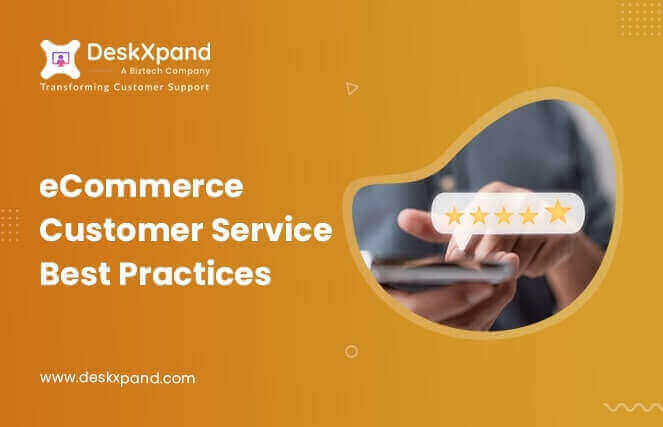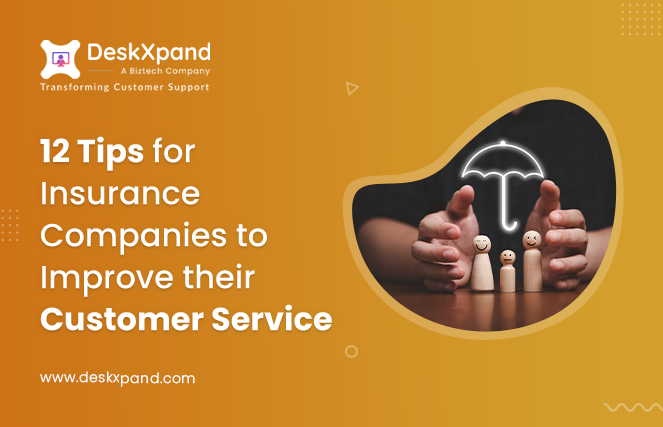40% of an eCommerce store’s revenue comes from repeat customers. ?
However, retaining customers and bagging their loyalty is easier said than done.
It only takes one instance of bad customer service to turn a loyal customer into an ex-customer. ?
Look at this number!

While no company, including yours, sets out to provide poor service, customer expectations are rising extremely fast.
Here’s what customers want…
✅ Instant gratification
✅ Speedy replies
✅ Personalized service
If you are an ecommerce stakeholder, improving your brand’s ecommerce customer service should be at the forefront of your business development plans.
With proper practices in place, you’ll be able to exceed what customers expect from you.
The goal of this article: To help you provide a unique customer experience that supports your brand’s promise.
An overview of the topics this post covers:
Before we jump onto the how part, let’s first see some common customer support mistakes that eCommerce companies must AVOID.
DON’T make these mistakes ?♀️
#Mistake 1: Taking too long to respond
Customers don’t like to wait, especially when there is an issue at hand.
Hence, the first interaction support reps have with them, becomes crucial.
Replying on time will help establish a friendly atmosphere, putting your customers at ease.
To achieve this, eliminate every possible hurdle that stops support teams from providing timely replies.
✅ Make information about your products easily accessible to them. That way, they will not have to waste time searching for information.
✅ Ensure that each query goes to the right agent who has the expertise and skills to solve the problem. Customers don’t like when they have to repeat their issues to different agents.
DeskXpand help desk software
Streamline your eCommerce support and service processes with the first-ever one-page ticketing solution. Manage and respond to queries from different channels smoothly.
#Mistake 2: Lack of personal touch
Customers experience a lack of personal interaction everywhere.
This grows into frustration when they run into issues that do not get solved for weeks.
Adding insult to injury, customers are not compensated properly even after getting their issues resolved.
All this leads to a customer leaving the brand, followed by bad publicity.
And let us all be realistic, every ecommerce brand wants to stay away from the bad press that eventually leads to less retention.
✅ Empathy is a key skill that helps support reps understand the pain of customers. Based on this, they can change the tonality of messages.
✅ Live chat is a great communication channel that helps you connect with customers in real-time.
#Mistake 3: Ignoring your customers’ preferred communication channel
Email or contact form is not the only channel your customers use. They share their grievances or provide feedback on social media platforms as well.
Hence, it is important for eCommerce brands to be available on multiple platforms.
✅ With an omnichannel help desk, you can manage multiple channels from a single place. Without switching tabs, you can respond to customer queries easily.
#Mistake 4: Not tactfully managing return and exchange
eCommerce returns and exchanges are inevitable. But what matters is the way you deal with them. The priority should be on providing customers with the convenience of returning their items.
✅ eCommerce stores can save time by optimizing their return process. For instance, using a help desk, you can create scenarios for returns and refunds. So, every time there is a return-related issue, you will not have to perform tasks manually. The ticket gets tagged and assigned without manual intervention.
See how you can optimize your eCommerce support processes for higher efficiency using a help desk!
11 ecommerce customer service best practices
Online shopping has become all “me-commerce,” where consumers want to enjoy aspects such as 24×7 support, easy returns and refunds, unlimited offers, and more.
Brands need to offer reliable ecommerce customer service at every touchpoint for customers to keep coming back to the online stores and avoid competition.
Whether it is about offering a self-service portal or offering personal attention through live chat, the following 11 ecommerce customer service best practices have got you covered:
1) Organize and prioritize incoming requests
A huge influx of tickets can put a lot of pressure on support agents. With a proper system in place, it becomes easier to capture and solve customer queries in a timely manner.
And that is where help desk software enters. From one place, you can take care of all customer support and service-related communication.
It enables you to filter and sort queries, assign them to the right agent, and respond to queries–all without switching tabs!
Thus, with effective ticket routing, you can reduce the resolution time, improve agent productivity, and enhance customer satisfaction.
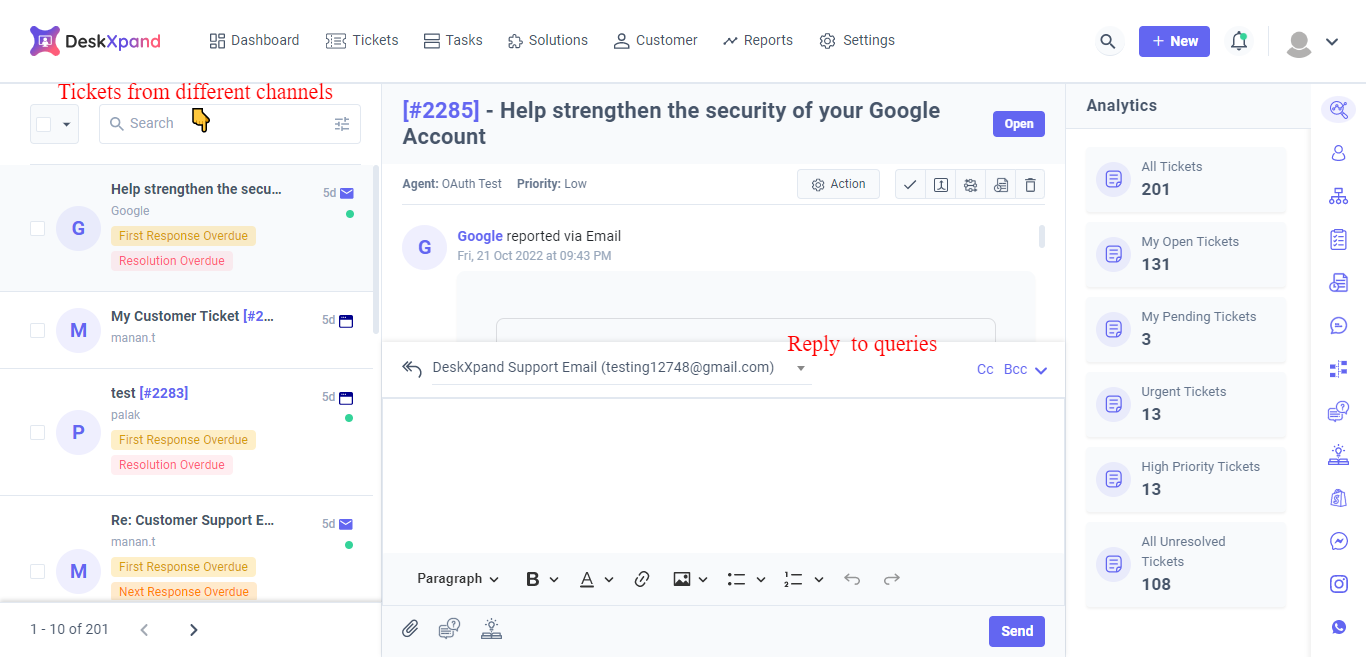
Ticket management simplified
Optimize the process of ticket routing to make customer support operations more efficient. Take a free trial of DeskXpand help desk right away!
2) Empower customers with self-service knowledge base
Customers do not always have the zeal to contact an agent to resolve their issues. They don’t want to wait for agents to pick up their calls or email them back.
Sometimes, they want to do the job themselves and much more quickly. The ability to resolve an issue on their own is indeed an empowering feeling.
This is why you, as a brand, should work towards creating a dedicated knowledge base so that customers can simply search their queries whenever they want.
Create knowledge base articles on areas such as return policies, shipping, refund procedure, estimated delivery dates, and much more.
Many ecommerce sites have multiple online sellers for their websites. They can also include a dedicated knowledge base for the sellers.
Example: Etsy, an online store for crafts and handmade products, has created different sections for sellers and customers.
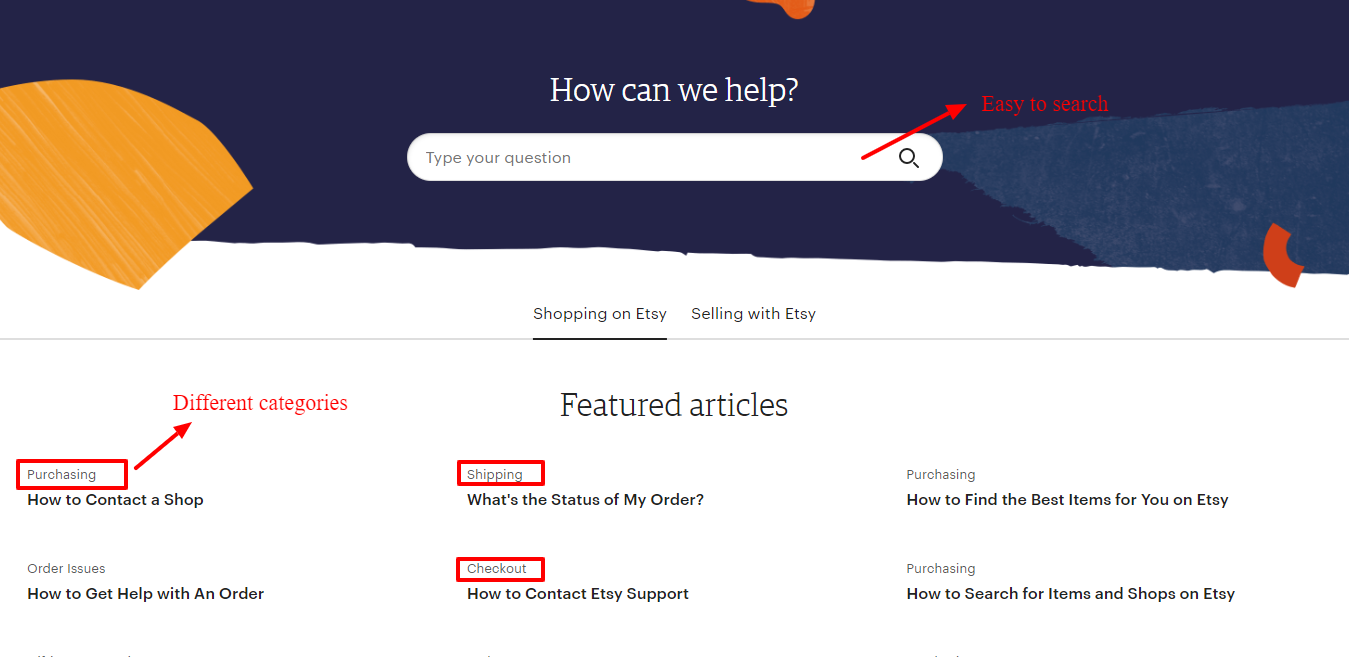
Delight your customers’ self-service experience; you can include self-help blogs, FAQs, or news about your upcoming services.
Besides this, you can also include how-to guides and instructional videos to guide your customers better.
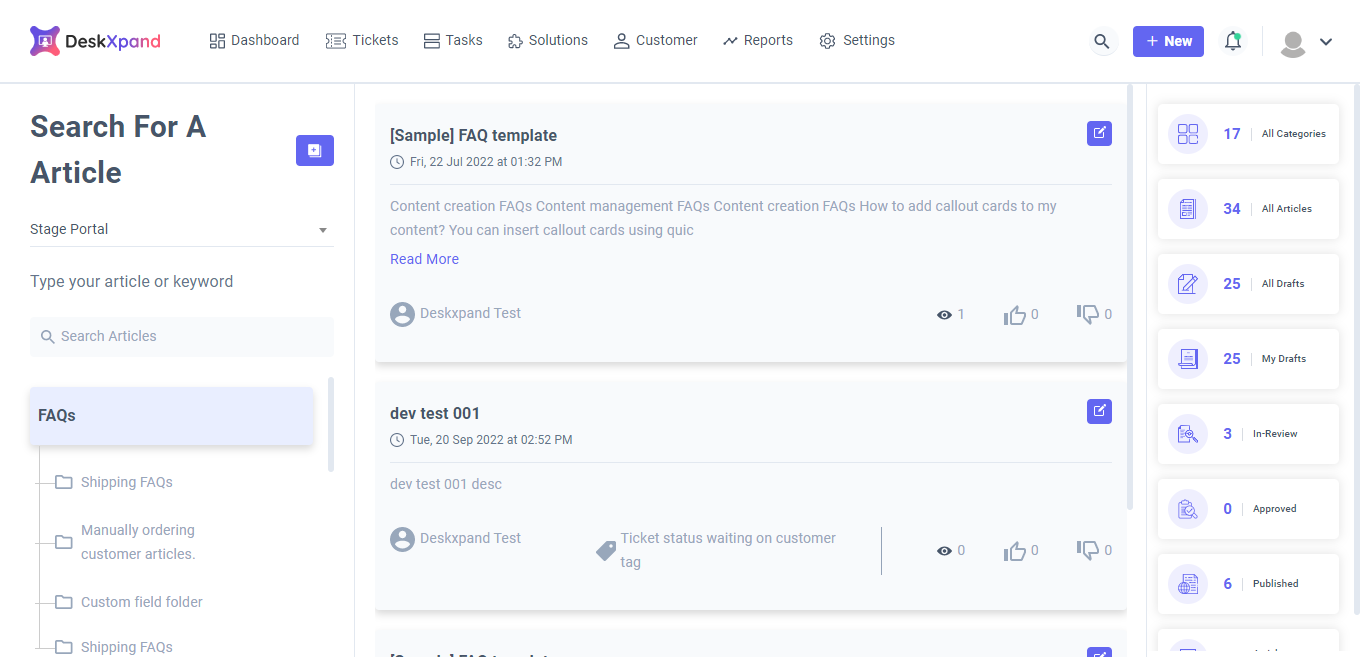
Build a knowledge base
Create knowledge base articles, FAQs, how to guides to help your customers find quick answers!
3) Identify what your customers want
Assessing customer needs is the very first step in building and maintaining extraordinary customer service. In fact, it is one of the most impactful priorities for ecommerce customer service.
Different companies rely on different methods to understand customers. Some conduct direct interviews, while some seek insights using social listening.
| 5 things customers expect from support teams ?♀️ |
|---|
| ✅ Listen to the feedback they provide |
| ✅ Empathetic responses |
| ✅ A personalized support experience |
| ✅ Quick support and instant replies |
| ✅ Ability to self-help |
4) Adapt an omnichannel approach
65% of customers think that it is easy to contact a business through the phone. 39% of customers find it more convenient to approach a brand via social media. – Statista
If you see your brand as ever-growing and expanding, you should leave no stone unturned in offering omnichannel customer support. If you limit your communication channels to just phone or email, you might eventually make your customers run to your competitors.
Omnichannel customer support means:
➡️ Providing multiple touchpoints to the customers so that they can communicate using the channel of their choice.
➡️ However, at the support end, everything can be managed from a single interface without jumping from one channel to another.
Omnichannel support ensures that agents can manage messages and queries, all from a single dashboard. It helps prioritize requests and respond to them without changing tabs.
An omnichannel help desk puts everything in one place and helps you streamline all the incoming queries from various channels like email, feedback forms, self-service, social media channels, etc.
| With omnichannel support ✅ | Without omnichannel support ❌ |
|---|---|
| A smooth, continuous customer journey from one channel to another. | It restricts agents from having a continuous conversation. |
| Your customers will not have to keep repeating their issues. With omnichannel, agents have context. | Agents do not have context and information they need to quickly solve a query. |
| Omnichannel unifies different communication channels. | You don’t get a unified view of interactions across channels. |
Provide the best omnichannel experience
Go from flipping through various browser tabs to managing everything from a single window. Use DeskXpand to streamline multiple channels like email, feedback form, knowledge base, and help widget.
5) Personalize every interaction
Personalization is the root of every pleasant ecommerce customer experience.
Whether it is in the form of personalized emails, product recommendations, or simple greetings on customers’ special days, personalization rules the ecommerce customer support world.
Here are some steps to get started with serving personalized support:
➡️ Encourage support reps to always use first names while interacting with a customer.
➡️ Have all the customer information gathered on one unified dashboard. This helps agents deeply understand an issue and provide personalized support.
➡️ Take the hyper-personalization approach. Enable customers to connect via live chat, video chat, chatbot, etc.
➡️ Map the customer journey to know how a customer travels through different touchpoints. Understanding their journey will help address their needs at a personal level.
6) Improve first resolution time
First contact resolution is the number of customer issues that are resolved by your team during the first interaction only.
Here are some solid reasons why you should aim for first-contact resolution:
➡️ If the issues are resolved in the first interaction, your agents will have to deal with less number of escalations and repeat contact. This saves a lot of time for everyone.
➡️ First contact resolution has a direct impact on the efficiency of the customer support team. You can handle more issues with limited team members.
➡️ First contact resolution is a key driver of customer satisfaction. It is a home run for any growing business.
A large number of ecommerce experts might have heard about FCR; however, only a handful of them get the gravity of the term. These simple tips will help you reduce the first resolution time:
| How to minimize resolution time ⏰ |
|---|
| Ensure each query is assigned to the right agent who has the skills and knowledge to solve it. |
| Automate the repetitive process of ticket assigning. |
| Provide self-service options so customers can solve simple queries without an agent’s help. |
| Set SLA targets to give agents clarity on how to best meet customer expectations. |
| Instead of writing the same replies, use canned responses. |
Make your eCommerce support and service operations smoother and faster using a help desk.
7) Automate whenever necessary
Ecommerce customer service agents always have to deal with innumerable support issues, deadlines, pressure, and difficult conversations.
Automated customer support can turn out to be a boon here. Helpdesk automation can help you rise above repetitive, mundane, time-consuming manual tasks.
An automated workflow makes life easier for everyone, from support agents to customers. But, bringing in the right amount of automation is the trick.
When it comes to ecommerce customer service, brands should start with automating small, repetitive tasks like:
| Here’s what you should automate ? |
|---|
| Ticket registration & creation |
| Ticket assignment |
| Ticket escalation |
| Identifying ticket collisions |
| Ticket routing |
| Email notifications |
| Deleting closed tickets |
| Ticket priorities |
| Collecting feedback |
Help desk automation
Lessen laborious manual tasks, streamline your ticketing flow, and save time with helpdesk automation functionalities.
8) Proactive customer support over everything else
A majority of online sellers focus on providing reactive support, i.e., taking action only after a customer encounters an issue. So much so that they forget the importance of proactive support.
There’s a very thin line difference between both. For instance, reactive support would mean confirming a delay in the shipment only when the customers ask for an update.
Proactive support would mean that you anticipate a delay and notify the customer about the same at the earliest.
Anticipating customer problems in advance will bring down the overall escalations, and it should be the first line of defense against customer queries.
How to offer proactive ecommerce customer support?
➡️ Announce problems before customers notice the problems themselves.
➡️ Be transparent with the customers about every little update.
➡️ Follow up with customers regularly, especially after the issue has been resolved.
➡️ Set up automated emails to confirm whether the customers are facing the same issues again.
➡️ Take accountability for your mistakes. Accepting your mistake at the time of adversity can turn the situation around.
9) Optimize your website with live chat
Customers tend to have questions on their minds while scrolling through an ecommerce website. Be it questions related to discounts, the sold-out products, or product characteristics; if customers do not get answers on the fly, they’ll exit your website.
*Enters live chat widget*
Offering instant help through a live chat widget can get the job done. Live chat is considered a feature that has one of the best customer satisfaction rates.
Majority of the customers feel satisfied when they use live chat compared to any other communication option.
Integrating a webchat widget into your online store is considered a great ecommerce customer service strategy.
Here’s why:
➡️ Customers can get in touch with an agent instantly.
➡️ Agents can handle multiple chat sessions simultaneously, which is not possible on other channels like phones.
➡️ Generate upselling and cross-selling opportunities.
➡️ You can integrate your knowledge base into the help widget.
➡️ It lets you keep customers engaged and serve them a personalized experience.
10) Being customer-centric will take you a long way
Customer-centric companies are 60% more profitable than companies that don’t focus on customers.
Customer centricity should be the core part of any brand’s goals and values.
So, how do you put the customer at the center of everything? By bringing together:
- Relevant query assortments (trending assortments)
- Customer data
- Predictive analytics and reporting
These three aspects give brands the ability to be fully customer-centric and allow the customer to dictate how they want to communicate regardless of channel.
| Building customer-centric strategies involves |
|---|
| Active listening through feedback |
| Meeting your customers where they are |
| Making customer insights accessible to support agents |
| Operationalizing customer empathy into policies |
| Investing in tools that allow you to be customer-focused |
Example
Zappos, a retail company that deals with shoes and clothing is an excellent example of how companies thrive by having a customer-centric model.
Here’s what you can learn:
Zappos provides great eCommerce customer service with personal-level engagements. The company encourages its representatives to actively listen to customers on social media, and engage with them in a personalized way.
Related read: 5 Unbeaten Strategies for Building Customer-Focused Culture
11) Consider improving the overall digital experience
According to a study by McKinsey, at least 80% of customer interactions are digital in nature.
Brands need to reimagine and push their digital customer journey in order to elevate the ecommerce customer service experience for their buyers.
It is no surprise that websites that deliver the most personalized customer journey have received the most loyalty and sales from their customer base.
In a nutshell, a personalized customer journey that puts the customer at the center of everything will benefit more as compared to the brands that don’t.
| Tips on how to elevate your customer’s digital experience ✨ |
|---|
| Make sure customers can reach out to you easily. |
| Empathize with your customers, and add a personal touch. |
| Your live chat or help widget should give relevant information within seconds. |
| Ensure that your knowledge base answers precisely what the customer wants. Adding advanced filter and sorting tools features will help. |
| Make sure that your response time for live chats is lower than the average expected time (which currently is within a few seconds.) |
Example
Sephora, the beauty brand, does a great job at delivering great digital experiences.
Here’s what you can learn:
The brand makes maximum advantage of technology to provide an interactive shopping environment. For instance, its app comes with AI feature called virtual assistant. It uses facial recognition to enable customers to virtually try-on makeup products.
Your 7-day game-changer plan to enhance eCommerce customer service
Ecommerce customer service acts as a guide to online buyers, and it plays a huge role in determining customer satisfaction.
Operating your ecommerce customer service without the right tools at your disposal can make things complex.
The best way out is to use an ecommerce customer service software that:
- Streamlines your ticket routing process
- Helps you assign tickets to the right agent
- Helps you solve support queries faster
- Helps your customers help themselves
- Lets you automate needed functionalities
- Enables you to serve empathetic responses
- Helps you evaluate your support with analytics
- Personalizes your support encounters
Start serving your customers with DeskXpand ecommerce customer service software today!
12) Cut Down on Your Response Time
When it comes to customer service, customers always need a quick response.
As when they reach out to customer service agents, most probably they are looking for a solution to their issues.
Imagine, in such situations if the customer service agents are not responding quickly or even worse not responding at all. How would you feel?
Apart from all the anger and frustration, you would think not to engage with such a brand again.
A brand is of no use if it is not available for the customers when needed the most.
So, as a business, you have to stay proactive and respond to the queries of your customers quickly.
Here are a few things to do in order to cut down on your response time:
- Use automated responses
- Set time-based email alerts & notifications
- Track response time effectively
13) Measure and Optimize for Improvement
How to know whether your customer service team or the agent is performing as per the expectations or not?
What can be done to know how much time is taken by the agents to resolve a query?
The answer to these questions is analytics.
With its help, you can measure the performance of your agents and optimize the areas that need immediate attention.
Analytics can get you insights into the valuable data of the customer service department.
Data such as the past history of the customer or the agent, the average time taken to resolve the queries, etc.
Frequently Asked Questions
Q. What is eCommerce customer service?
Ecommerce customer service simply refers to the process of providing support and assistance to online customers. This includes everything from making better purchase decisions to resolving issues— all while creating a seamless customer experience across multiple touchpoints.
Q. What makes a good eCommerce customer service experience?
- Providing quick responses.
- Consistent experience across multiple communication channels.
- Self-help options in various formats such as knowledge base articles, video tutorials, how-to guides, etc.
Q. How to optimize customer service for eCommerce?
The first step is organizing and streamlining the ticketing process. A help desk software like DeskXpand can help you with that. Without manual intervention, you can assign incoming tickets to the right agent. It also lets you handle queries from different support channels from a single place to improve efficiency.
Q. How to handle eCommerce customers?
Customers today want quick replies to the grievances they face. To meet their demands, brands need to prioritize having the right tools that help them manage customer queries easily.
Q. What should eCommerce customer support specialists focus on?
One crucial thing that eCommerce support teams should focus on, is enhancing the way they interact with customers. This could mean answering customer queries on their preferred channels, reducing resolution times, taking their reviews seriously, providing self-service options.
*This article was written in collaboration with Yesha Bhatt

